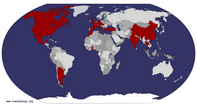To explore a little more about this idea of the sense of contentment in Calcutta…
I’ll preface by saying that I have read travelers who have been around the world, traveled to Africa even, and never seen the extent of poverty that can be found here.
Jacob and I have only met and talked with mostly Brahmin and warrior caste people which is probably limiting our perspective.
The four castes are these: Brahmin (priest), warrior (Kshatriya), merchant/businessman (Vastriya) and artisan/labor (Huiti). The bottom isn’t really a caste—they are the Untouchables, the Dalits.
This is the sorrow of Hinduism and karma—while it might provide a neat, packaged explanation for why there is such inequality, it also means there is a universal feeling that “you deserve what you get.”
Caste system has been outlawed in India. Everyone assures us it no longer matters, and I think each generation it matters a little less. But it is telling that we haven’t befriended anyone of the lowest castes. The reasoning being that they are less educated and less likely to speak English.
We meet people who live on the streets but they can only speak Bengali usually. Nevertheless they are friendly, want us to meet their families, want to know where we are from.
Our guest house
 The caste system persists in that there is a servant culture. We have servants here. It’s like we normally would if we were in a hotel. The difference is, our cook and housekeepers are living in the house we live in. They don’t live with their families. It is one more sort of tragic situation that it seems a majority of low-paid people do not get to see their families but once a month or twice a year.
The caste system persists in that there is a servant culture. We have servants here. It’s like we normally would if we were in a hotel. The difference is, our cook and housekeepers are living in the house we live in. They don’t live with their families. It is one more sort of tragic situation that it seems a majority of low-paid people do not get to see their families but once a month or twice a year.
Our friend in Turkey, Ali, had a similar situation. He loved his wife and kids and talked about them often. But he had to live in Istanbul because there was no way to make money in the town he came from. He worked in a dirty little shop gluing Nike shoes together. India is full of stories like that. And so it goes.
But it doesn’t seem tragic to them and here’s why I think this is so:
It’s an improvement from their situation. Calcutta is actually one of the better places to be in comparison to its neighbors. Hence, the reasoning behind the lack of despair that I feel in the people of the city.
For example at a home we visited last night, the servant girl was from the Sunderbans, home of the Bengal tiger a bit south from here. She was very young and sent to a wealthier family to work. Is it sad that she is growing up away from her family and having to work as a maid? Or is it sadder that in her home there is no food and no hope for a better life? Here in her work place in Calcutta she actually gets clothing, plenty of food, and even a little schooling.
 Or take the people who live on the street. Most of them are from the poor surrounding states of Bihar or Orissa, or refugees from Bangladesh. Those places are worse than here, I’m told. Here there are public fountains where you don’t have to go far to get water. Here there are places to beg, and the Kali temple gives a bowl of rice every day to the city’s poor. There may be employment opportunities. Or take the boys at Daya Dan. They come from lying unattended in the streets. Their parents probably viewed the birth of a child with disabilities as bad karma and were ashamed of them. Now they get regular meals and tutors and books. It is an improvement—every person we see whose situation looks bad, there is always someone next to them whose situation is worse. Maybe this helps the feeling of optimism.
Or take the people who live on the street. Most of them are from the poor surrounding states of Bihar or Orissa, or refugees from Bangladesh. Those places are worse than here, I’m told. Here there are public fountains where you don’t have to go far to get water. Here there are places to beg, and the Kali temple gives a bowl of rice every day to the city’s poor. There may be employment opportunities. Or take the boys at Daya Dan. They come from lying unattended in the streets. Their parents probably viewed the birth of a child with disabilities as bad karma and were ashamed of them. Now they get regular meals and tutors and books. It is an improvement—every person we see whose situation looks bad, there is always someone next to them whose situation is worse. Maybe this helps the feeling of optimism.
The Kalighat Kali Temple







1 comment:
Jack is studying India in his social studies class right now. I showed him this post, and he knew a lot about castes. I think he should get extra credit for your travels to India.
Post a Comment